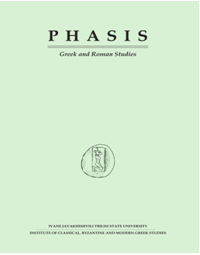Das Erlöschen des Glaubens: The Fate of Belief in the Study of Roman Religion
DOI:
https://doi.org/10.48614/phasis.20.2017.83-150Abstract
This essay traces the development of a consensus against belief as a category relevant to the study of ancient religion, taking Roman religion as a case in point. The anti-belief position began with Christian disparagement of traditional worship and continued with late-20th-century cultural relativism. After dismantling arguments that belief is unique to western cultures, I introduce the cognitive theory of intentionality. On this theory, all mental states represent or are about objects and circumstances in the world. I distinguish two broad mental state types: the practical, such as desire, which represents circumstances as we would have them be, and the doxastic, such as belief, which represents circumstances as we take them to be. Insofar as the Romans represented circumstances as obtaining, they had beliefs. Three payoffs follow from this approach. First, beliefs often underlie emotions, because emotions amount to our evaluations of circumstances we take to obtain. So, when Romans record emotions in connection with religious events, researchers are licensed to ask about the beliefs at the root of those emotions. Second, beliefs (along with practical states) underlie action, because in order to act, agents require a cognitive map of the space of possibilities for action. This is provided in part by belief. So, when Romans record religious action, researchers are licensed to inquire into the beliefs that demarcated the parameters of the action. Finally, in representing objects and circumstances, beliefs represent them in a certain way. This puts beliefs at the foundations of social reality, for it is only by virtue of being represented as a pontifex that any Roman ever counted as a pontifex, and it is only by virtue of being represented as a sacrificium that any act of animal slaughter ever counted as a sacrificium. Thus, far from being an irrelevant category for researchers, belief turns out to be central to Roman religious cognition, religious action, and religious reality.
Downloads
Published
Issue
Section
License
Copyright (c) 2017 PHASIS

This work is licensed under a Creative Commons Attribution-NonCommercial 4.0 International License.


